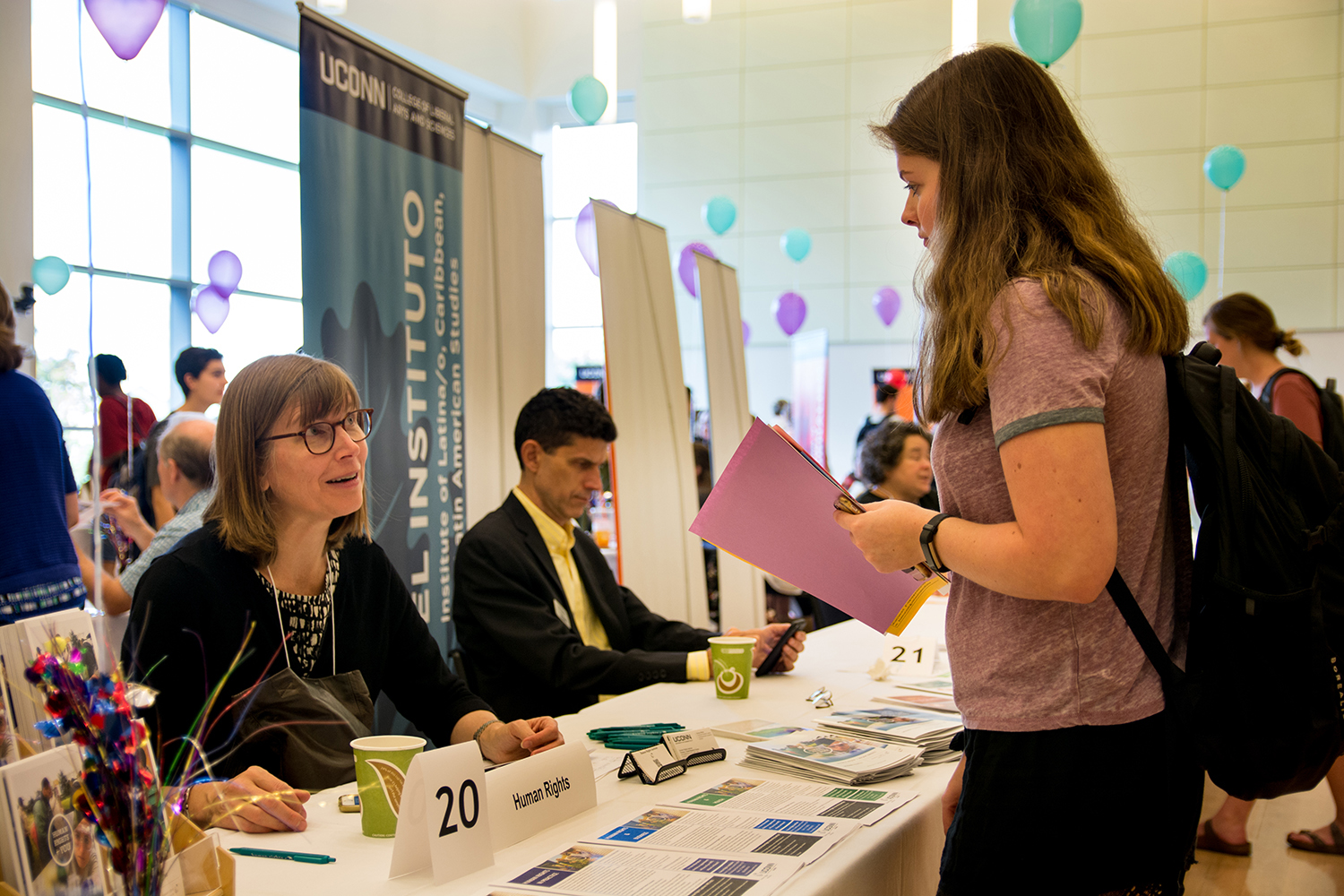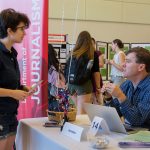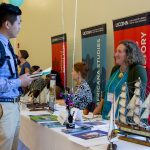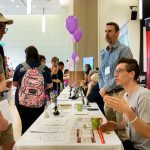Students who are undeclared, those who are looking to switch majors, and those interested in adding another program of study found plenty of food for thought at the annual Major Fair this week.
The event, which is sponsored by the College of Liberal Arts and Sciences and the Academic Center for Exploratory Students (ACES), is the first step for many students in exploring the breadth of majors offered by the University.
Out of more than 110 majors offered at UConn, more than 50 set up tables and displays, staffed by faculty, staff, and students, in the Student Union Ballroom on Wednesday, creating an interactive catalogue that enabled attendees to connect with each major’s content in a way that is impossible through a screen or page.
“Having so many UConn majors, departments, schools, and colleges available in one space makes it easier for students to explore,” said Julie Lynch, academic advisor in the Academic Center for Exploratory Students (ACES) and coordinator of the Major Fair. “It’s nice for students to talk to other students who are in the major they might be interested in.”
Matthew McCarthy ’20 (CLAS), a philosophy major, co-hosted a table with associate professor of philosophy Thomas Bontly. McCarthy’s pitch was equal parts informative and persuasive.
“Philosophy is something that’s applicable to multiple different disciplines,” he said. “It’s a way of thinking about the world in a logical, thought-out way. You can really apply that to anything, whether it’s business, law, or finance. It’s a very flexible major.”
McCarthy plans to incorporate his interests into city planning and design.
“I’m really interested in how philosophy can be incorporated with city design, ethically, and when talking about the environment,” he said. “There are a lot of important questions now about how we should design cities.”
Mariah Santana ’21 (CLAS), a psychological sciences major considering a double minor in accounting and American Sign Language (ASL) studies, originally planned to pursue a single major in accounting.
“I actually decided on a whim to take [American] Sign Language this semester,” she said. “I’m a few months in and fell in love with it instantly.”
Santana was one of many students who reveled in the fact that they could add on to their initial pursuits through double majors and minors.
“Being able to take so many things at once is definitely a mind-opening experience. I’m so excited to just dive into everything, learn more about the parts of the brain, learn more about Deaf culture,” she said. “And maybe those two will correlate and help me when I’m going into my CPA and other life endeavors.”
First-year student Kimoya Wallace ’22 (CLAS), a biological sciences major, said she came to the fair looking for a major tailored to her specific interests within biology.
“I’m mainly interested in human body-focused majors like physiology and neurobiology and molecular and cell biology, because I’m pre-med,” she said.
Biomedical engineering major Maxwell Landolina ’22 (ENG) said he chose his major because he has always welcomed a challenge, but he welcomed the opportunity blend multiple majors.
“I wanted to go pre-med, but not necessarily the normal way,” he said. “I’m thinking about doing a language, too. French, or Spanish, or Portuguese … I don’t know yet. I can’t choose!”
About 85 percent of UConn and CLAS graduates report successful employment, continued education, or service; and the post-graduation benefits of a multidisciplinary education are not lost on Landolina.
“I think it gives you an advantage, especially with pre-med and applying [to schools]. You can show that you have a diversity of interests,” he said. “It’s a real big step up.”
Many of the students in attendance were undeclared or in ACES, the flagship UConn advising program that helps students explore UConn programs and complete program requirements.
Johnson Hoang ’22 (ACES) said he came to the fair in search of a way to channel his interests into a major and minor that are the perfect fit.
“I am interested in science, but I’m also interested in English, and generally those two don’t mix. But coming here I found a lot of overlap that really applies to both,” he said. “I can actually do what I want to do while I’m in college and not just go into ‘cookie cutter’ majors. I don’t have to just do biology – I can do all these other fun things.”
When asked to choose his top pick of a major, Hoang was hard-pressed to choose among the breadth of options.
“Just one? I’ll give you my top three! English, Spanish, and an individualized major in science,” he said. He noted that he would love to participate in an education abroad experience in Grenada that coincides with pre-health.
Adrienne Bruce ’22 (CLAS), a Chinese major, said she came to the fair looking to personalize her major and discover other options. She said being able to incorporate multiple areas of study is important to her: “I think it’s really special because it’s unique to you, it’s unique to your path and what you want to do in life.”









